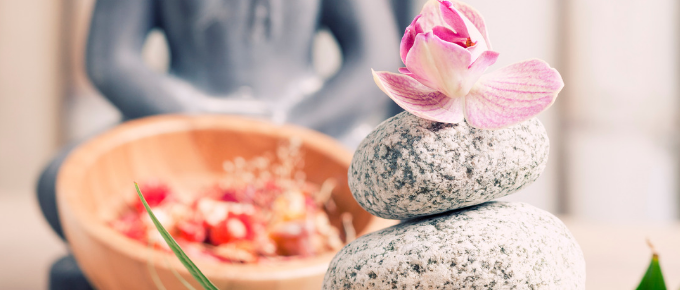So you’ve taken the dosha test and determined that you’re a kapha. Sounds good, but what does that actually mean?
What are the characteristics of the Ayurveda Kapha dosha?
In this series, I’m going to be providing an overview of each of the three Ayurveda doshas, starting with Kapha.
Ayurveda Kapha Dosha

Kapha Dosha Personality
Kapha’s are comprised of the characteristics of earth and water, and are often considered to be the most friendly and approachable dosha.
In general, people with the kapha dosha tend to be calm, compassionate, easy-going, forgiving and good natured. Kapha’s are slow to anger compared to pitta’s and well-ground compared to vatas. Kapha’s can sometimes take a bit more time to learn new things, however they’re fortunate to have a good memory.
When it comes to money, kaphas usually have a knack for earning it and generally avoid overspending.
If kapha’s get out of balance, they can start to manifest envy, greed and attachment to people and things and may start to become possessive and jealous in their relationships.
However, in general, kapha’s tend to have a stable personality when compared to vata and are usually steady and reliable, even in a crisis.
Kapha Body Type
Kapha’s tend to have a stronger, broader body frame and are not usually big fans of exercise.
Kapha skin is oily and smooth and kapha’s generally have thick, healthy hair.
When it comes to perspiration, kapha’s tend to perspire moderately compared to pitta. Perhaps one of the most enviable traits of kapha’s is the fact that they normally enjoy deep, high quality sleep.
Kapha Health Conditions
Kapha health issues are generally related to water, with kapha’s more likely to suffer from frequent colds, flu, sinus congestion and mucus. Kapha’s also have a sluggish digestion and poor circulation which can lead to weight gain and obesity.
Some symptoms to watch out for include:
- Lack of energy
- Weight gain
- Trouble losing weight
- Type 2 diabetes
- Water retention, especially in the ankles
- Headaches/migraines
Kapha’s often find themselves experiencing imbalance during full moons due to the amount of water they retain.
Kapha Health Considerations
Because kapha’s have a tendency to gain weight easily, they should try to eat bitter and pungent foods. Foods that are interesting and offer a variety of flavor can help to prevent kapha’s from overeating.
Even though exercise isn’t usually a kapha’s cup of tea, exercise is crucial for kapha’s.
Kapha’s should avoid dairy products, fried or greasy foods, sugar and salt as much as they possibly can due to their sluggish digestions and tendency to gain weight.
To boost digestion, kapha’s should increase their intake of high fiber foods, including vegetables and legumes. Some of the best legumes for kapha’s to consume include black beans, mung beans, pinto beans and red lentils.
When you’re consuming your vegetables, it’s recommended that kapha’s lightly steam or stir fry their vegetables in order to make them easier to digest.
When it comes to fruit, aim for drying fruits such as apples, apricots, cranberries, mangoes, peaches and pears. Try to avoid very sweet or very sour fruits like berries or citrus.
Kaphas do not need large amounts of protein, so they should avoid all red meat and stick to small portions of chicken, seafood and eggs if they can’t do without animal products.
The best oil choices are small amounts of almond and sunflower. A small amount of ghee and limited amounts of goat milk and cheese can be used.
Kapha Dietary Guidelines
Kapha people should avoid all sweets. The only sweetener allowed is raw honey. In terms of spices, they can use almost any seasoning except salt. The best choices are ginger and garlic.
Kapha people should generally avoid coffee or tea unless they are strongly kapha, with not much vata or pitta. Since no one really need tobacco or alcohol, they are best avoided. In terms of alcohol, if they do wish the occasional drink, it can be a glass of wine.
Signs That Kapha is Imbalanced
When a kapha is experiencing imbalance, this can manifest in a variety of ways including:
- Weight gain
- Feeling sluggish
- Low mood
- Brain fog
- Jealousy and possessiveness
- Congestion
- Excessive mucus
How to Balance Kapha Dosha
- Adopt a Vegetarian Diet
One of the best ways to balance kapha is to adopt a vegetarian diet. Meat is difficult to digest and because kapha’s have sluggish digestion it’s recommended that kapha’s eat an abundance of vegetables, which are easy to digest.
- Increase Exercise
As mentioned earlier, although kapha’s generally aren’t a fan of exercise, it’s imperative that you implement regularly exercise into your daily routine. Regular exercise helps to get your blood flowing and can improve digestion.
- Take a Kapha Balancing Supplement
This Banyan Botanicals Kapha balancing supplement contains a powerful blend of warming herbs that can help to balance kapha.
Time to Evaluate Your Current Diet
If you’re a kapha, go ahead and evaluate your current diet. I recommend keeping a food diary for the next week and noting down everything you eat and drink to see how well it aligns with your dosha.
You can then start eliminating things that aren’t serving you and adding things that do.


